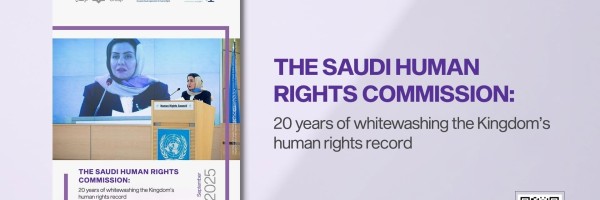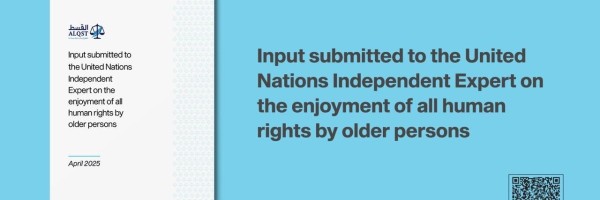"The Spotlight Fades, Repression Mounts Again", this year’s in-depth annual report of ALQST for Human Rights, documents and discusses key human rights developments in 2021.
Executive Summary
The start of 2021 saw Saudi Arabia’s leaders under intense international pressure to improve their dismal human rights record. Throughout the previous year, when Riyadh held the prestigious G20 presidency and hosted the annual G20 summit, ALQST, other NGOs and human rights supporters had helped to keep the spotlight firmly on the Saudi authorities’ violations. The impending change of US administration – as Donald Trump, a staunch defender of the Saudi leadership, was succeeded as president by Joe Biden – added to this pressure, and coincided with some announced reforms and concessions.
But as the spotlight faded, and as President Biden’s promise to “recalibrate” US-Saudi ties failed to drastically change relations – despite some symbolic measures early in the year – the Saudi authorities reverted to their habitual pattern of repression, with fresh waves of arbitrary arrests of writers, bloggers and peaceful critics, harsh sentencing of activists, and deliberate attempts to place the lives of prisoners of conscience at risk.
It is clear that only sustained international pressure on the Saudi authorities, led in name by King Salman but in reality by Crown Prince Mohammed bin Salman, will ultimately lead to meaningful progress towards full respect for basic human rights and freedoms in Saudi Arabia.
ALQST’s Annual Report on the human rights situation in Saudi Arabia in 2021 covers all of these developments in comprehensive detail, and offers many links to further information from ALQST’s resources.
The absence of fundamental laws creates a legal vacuum in Saudi Arabia but, on 8 February 2021, Crown Prince Mohammed bin Salman announced that by the end of the year the authorities would adopt new laws and revise existing ones to “reform the kingdom’s judicial institutions”. The announcement heralded the kingdom’s first codified Personal Status (or Family) Law, a Civil Transactions Law, a Penal Code of Discretionary Sanctions, and a Law of Evidence. However, no further details have yet been published.
The Saudi authorities claim that jurisdiction in the kingdom is based on Sharia law as interpreted by the Council of Senior Scholars, the kingdom’s highest religious authority. The country has no formal constitution, only a Basic Law of Governance that fails to embody fundamental rights and freedoms. Moreover, the kingdom does not have a criminal code but instead leaves legal interpretation to the discretion of judges, giving them enormous leeway to construe acts retroactively as crimes.
Meanwhile, the legal vacuum in Saudi Arabia is being filled with pieces of exceptional legislation, such as the Counter-Terrorism and Anti-Cybercrime Laws, which can be loosely interpreted to include a wide spectrum of offences.
In 2021, the Saudi authorities again made many arbitrary arrests of people peacefully exercising their right to freedom of expression and other fundamental rights. With so many prominent figures already behind bars, this year’s arrests tended to target younger and lesser known individuals including young activists and bloggers, as well as family members of those already detained. News also continued to emerge of individuals arrested in previous years, who have included writers and academics, religious figures, human rights defenders, and even government officials and members of the ruling family. Many of them are still in detention without charge or serving prison sentences after unfair trials. Given the difficulty of obtaining information on the ground, it is not possible to know the full extent of such arrests, which means that those described in this report, along with other violations, are likely to represent only a fraction of the total.
Dozens of prisoners of conscience were released in 2021 – often as a result of significant international pressure – either provisionally or after completing prison sentences, but even then only on stringent conditions that usually included arbitrary bans on travel, work and social media activity. Those conditionally released this year included five more women human rights defenders (WHRDs); 13 activists released having been detained since April 2019; two young men previously sentenced to death; and three released without charge after months in detention. All remained under heavy restrictions following their release, including ongoing trials on charges relating to their peaceful activism; strict probation conditions that make them vulnerable to re-arrest; and lengthy travel bans that sometimes also apply to members of their families.
The murder in jail of Musa al-Qarni in October 2021, and an attempt on the life of jailed human rights defender Khaled al-Omair, drew attention once again to the vulnerability of Saudi prisoners of conscience. Conditions in Saudi prisons are generally poor, with overcrowding and low standards of hygiene still common, and COVID-19 mitigation lax. Prisoners of conscience, however – those jailed or arbitrarily detained for their human rights activism, advocacy for reform, or voicing of unacceptable political or religious opinions – also often face cruel, inhuman and degrading treatment behind bars for which they have no access to legal recourse. Deliberate medical and administrative neglect, motivated by vindictiveness, has led to a number of deaths in detention in recent years, such as that of iconic human rights defender Abdullah al-Hamid in April 2020; and in 2021 the authorities stepped up this approach by deliberately placing a number of individual prisoners’ lives at risk. The enforced disappearance of many newly arrested individuals adds to fears for their safety.
Following a lull in judicial proceedings during much of 2020 in light of the COVID-19 pandemic, 2021 once again saw many detainees and prisoners of conscience brought to court to face unfair trials. Judicial proceedings in Saudi Arabia routinely fall short of international standards and fair trial guarantees. Common violations include the denial of access to lawyers and court documents, undue delays, and the holding of trials behind closed doors. Both the regular criminal courts and the Specialised Criminal Court (SCC), an exceptional jurisdiction set up in 2008 to try cases of terrorism, are notorious for their disregard of legal safeguards. In 2021, lengthy prison sentences were again handed down to numerous activists and peaceful critics for exercising their basic rights, including a 20-year sentence for humanitarian worker Abdulrahman al-Sadhan. Others had their convictions upheld or sentences increased on appeal, including human rights defender Mohammed al-Otaibi, whose prison term was extended to 17 years in total. In one politically motivated trial, dozens of Palestinians and Jordanians resident in Saudi Arabia were handed prison sentences ranging from six months to 22 years. Many more trials are ongoing.
The Saudi state executed 67 individuals during 2021, more than twice as many as in 2020 but well below the figure for every other year since King Salman came to the throne in January 2015. For the first time in many years, no executions were carried out solely for drugs-related offences. Meanwhile, the execution of a man in June 2021 for offences apparently committed when he was only 17 years old cast doubt on the authorities’ claim to have abolished the death penalty for minors. Dozens more detainees remain at risk of execution.
The authorities continued in 2021 to illegally expropriate land for development and force the eviction of hundreds of residents, including, in November, by demolishing a whole neighbourhood in Jeddah.
On 8 February 2021 Crown Prince Mohammed bin Salman announced new laws to be adopted by the end of the year, including Saudi Arabia’s first codified Personal Status (or Family) Law, but no further details materialised. Currently, in the absence of a codified family law, rulings on family issues are left entirely to the discretion of judges, who often discriminate harshly against women. And despite the authorities boasting of recent reforms in favour of women, 2021 ended with the oppressive male guardianship system still far from being dismantled and women still subject to male control.
In Saudi Arabia, lesbian, gay, bisexual and transgender (LGBT) people can face imprisonment, flogging and even execution for expressing their sexual orientation or gender identity. The kingdom has no written laws concerning LGBT rights, leaving matters to judges’ individual discretion. In December 2021, Saudi Arabia rejected a UN General Assembly draft that called on states to act to eliminate discriminatory laws and practices, including those based on sexual orientation and gender identity. Global celebrities invited to the kingdom have begun speaking out about the lack of LGBT rights there; in December 2021, Formula 1 driver Lewis Hamilton said publicly that he did not feel comfortable competing in the Saudi Arabian Grand Prix in light of the oppression of the LGBT community.
Stateless persons in Saudi Arabia, known as “Bidoon” (meaning in Arabic “without”, i.e. without nationality), continue to struggle and suffer hardship in every aspect of their lives, including education, health, work and family life. In November 2021, the Saudi authorities made moves towards the naturalisation of an unspecified number of foreign residents "with unique expertise", but this did not include any stateless persons, despite their far deeper ties to Saudi Arabia, the only country they have known or lived in. The number of Bidoon in the kingdom is estimated at between 70,000 and 250,000.
Migrant workers, who make up roughly one-third of the population, continue to live a precarious existence. In March 2021, the Saudi authorities introduced limited reforms to the notorious kafala (sponsorship) system, under which foreigners working in the kingdom are dependent on an individual resident who acts as his or her sponsor. However, the kafala system has not been fully dismantled, and the new arrangements contain significant loopholes and exemptions, including not covering millions of domestic workers.
As the conflict in Yemen entered its seventh year, fighting continued with a large-scale military escalation in Ma’rib Governorate from February 2021. The warring parties continued to commit grave violations, including indiscriminate attacks on civilian areas by Houthi forces, and indiscriminate military air raids by the Saudi-led coalition. Shamefully, in October the UN Human Rights Council narrowly voted against renewing the only international mechanism to investigate human rights abuses in Yemen’s conflict, following extensive lobbying by Saudi Arabia and other coalition partners. Western governments continued to supply arms to the coalition.
The year began with significant international pressure on Saudi Arabia to improve its appalling human rights record, following an increased international focus on the kingdom during its 2020 G20 presidency, and with the new US administration vowing to take a more critical stance toward Riyadh. While promises to drastically change US-Saudi relations failed to materialise, some positive steps were brought to bear on the Saudi authorities internationally, including a strong resolution from the European Parliament on human rights. July brought revelations of wide-scale phone hacking of civil society actors using the proprietary spyware known as Pegasus, leading to measures against its makers, the Israeli NSO Group. Meanwhile, the Saudi authorities carried over into 2021 their previous intensive PR strategy of investing heavily in international sporting and music events, to which at times there was some backlash.
ALQST’s Annual Report for 2021 concludes with a comprehensive list of recommendations for the international community and the Saudi authorities, and a detailed timeline of human rights-related events in Saudi Arabia throughout the year.




